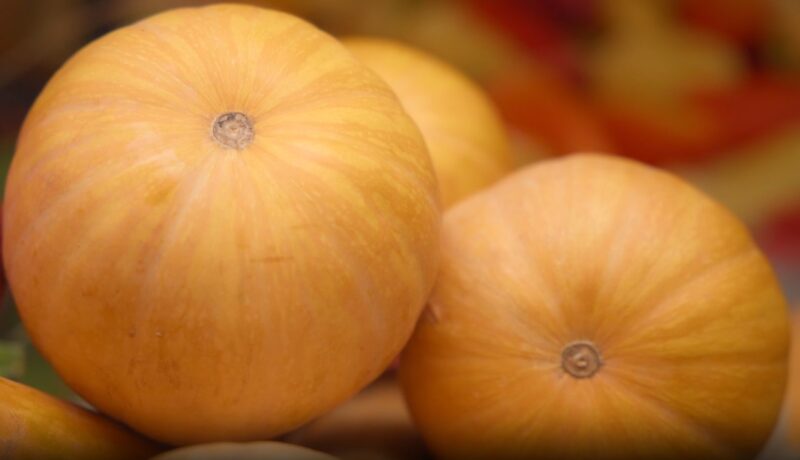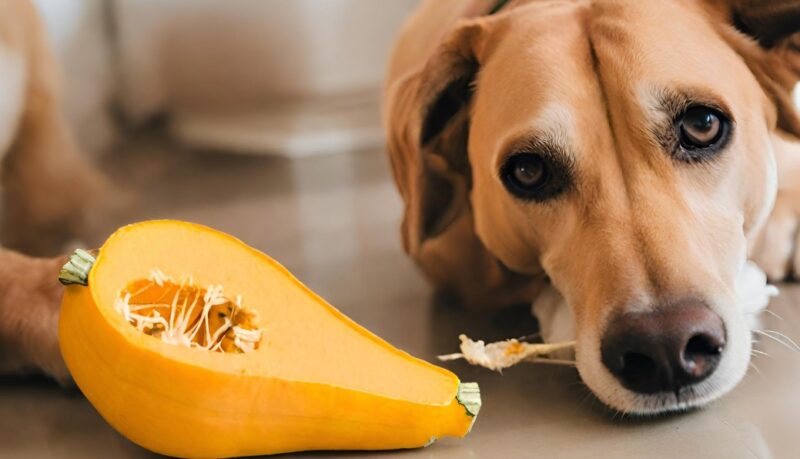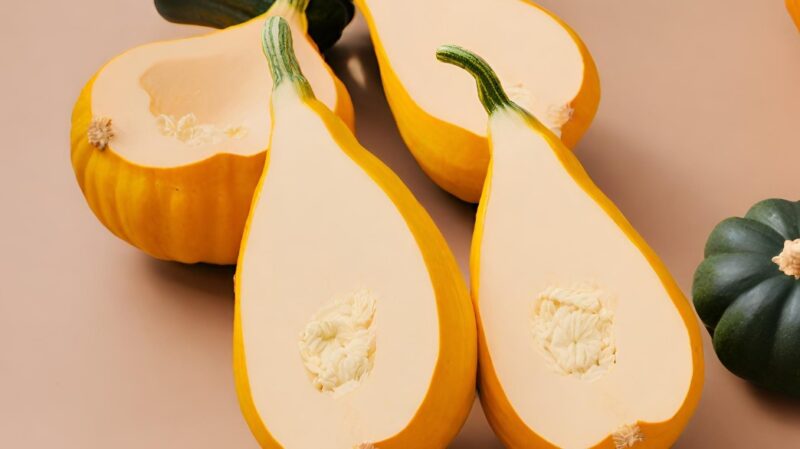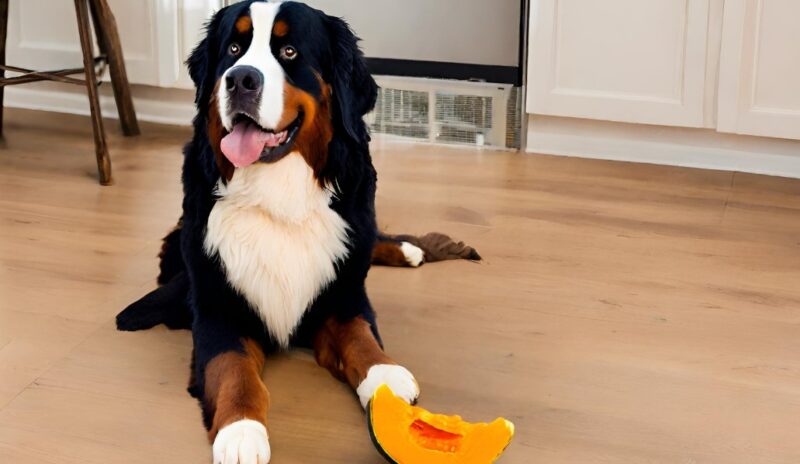Squash, a versatile vegetable, belongs to the Cucurbitaceae family and encompasses a variety of types like butternut, acorn, and spaghetti squash. In human diets, it’s celebrated for its nutritional value and culinary flexibility.
When it comes to canines, owners often question whether squash is a suitable addition to their pet’s diet. This article aims to explore the compatibility of squash with a dog’s dietary needs, considering both the benefits and potential concerns.
Nutritional Profile of Squash

Squash is a nutrient-rich vegetable. It’s an excellent source of vitamins, including A, C, E, and B-complex vitamins, and minerals like magnesium, potassium, and manganese.
Additionally, it’s high in dietary fiber while being low in calories, making it a healthy choice for weight management. The antioxidants present in squash help combat oxidative stress, contributing to overall health.
Benefits of Squash in a Dog’s Diet
Incorporating squash into a dog’s diet can offer several health benefits. The high fiber content aids in digestion and can relieve issues like constipation. Vitamin A supports eye health and immune function, while Vitamin C boosts the immune system. The low-calorie nature of squash makes it an ideal choice for overweight dogs. Also, its taste and texture can add variety to a dog’s meals, making it more appealing.
Preparing Squash for Dogs
The way squash is prepared for dogs is crucial. Raw squash can be hard to digest, so cooking it until it’s soft is recommended. Avoid adding seasonings, spices, or oils, as these can be harmful to dogs. The skin and seeds should be removed before serving, as they can be a choking hazard or cause gastrointestinal issues.
Potential Risks and Considerations
While squash is generally safe for dogs, there are certain risks and considerations. Overconsumption can lead to digestive upset. Dogs with specific health conditions like kidney disease should consume squash in moderation due to its potassium content. Always introduce squash gradually into a dog’s diet to monitor for any adverse reactions.
Squash Varieties and Their Suitability for Dogs

Different types of squash have slightly varying nutritional profiles. Butternut squash is rich in vitamins and minerals, making it a healthy choice. Acorn squash, though similar in nutrients, is harder and should be cooked thoroughly. Spaghetti squash, with its unique texture, can be a fun and nutritious addition. Always ensure that any squash type is prepared safely for canine consumption.
Moderation and Balance in a Dog’s Diet
It’s important to remember that while squash can be beneficial, it should only be a small part of a dog’s diet. Dogs require a balanced diet that primarily consists of proteins, fats, and carbohydrates suitable for their species.
Squash should be considered a supplement or treat, rather than a main component of their meals. Moderation is key to avoid nutritional imbalances or gastrointestinal issues.
Interactions with Other Foods
When adding squash to a dog’s diet, it’s crucial to consider its interactions with other foods. Squash pairs well with lean meats and other vegetables that are safe for dogs. However, it should not be mixed with toxic foods for dogs, such as onions, garlic, or grapes. Understanding these interactions helps ensure a safe and healthy diet for your pet.
The Role of Squash in Weight Management

For overweight dogs, squash can play a significant role in weight management. Its low-calorie and high-fiber content can help dogs feel fuller for longer, reducing the urge to overeat. When used as a substitute for higher-calorie foods, squash can aid in achieving a healthy weight. However, a comprehensive weight management plan should also include regular exercise and consultation with a veterinarian.
Precautions with Homegrown Squash
For those who grow squash at home, it’s important to ensure that it is safe for canine consumption. Avoid using pesticides or chemicals that could be harmful to dogs. Also, ensure that the squash hasn’t spoiled or developed mold before feeding it to your pet, as this could lead to health issues.
Squash Recipes for Dogs
Creating homemade dog treats with squash can be a fun way to incorporate this vegetable into your dog’s diet. Simple recipes include mashed squash mixed with a bit of lean chicken or baking squash into dog-friendly treats. These recipes should always be free from harmful ingredients like xylitol, chocolate, or excessive sugars.
FAQs
Can puppies eat squash, and if so, at what age is it safe to introduce it?
Yes, puppies can eat squash, but it’s advisable to wait until they are at least two months old and fully weaned. Start with small, cooked pieces to ensure they can digest it easily. Always monitor for any allergic reactions or digestive issues.
How often can I feed my dog squash, and in what quantities?
Squash should be an occasional treat, not a daily food item. A good rule of thumb is to make sure it doesn’t exceed 10% of your dog’s daily food intake. For a medium-sized dog, a few small pieces of cooked squash a few times a week is sufficient.
Are there any specific types of squash that dogs should avoid?
Most common types of squash, like butternut, acorn, and spaghetti squash, are safe for dogs. However, avoid feeding decorative squashes, like bitter gourd, as they can be toxic. Always research a specific type of squash before introducing it to your dog’s diet.
Can dogs eat the skin of the squash, or should it be peeled first?
It’s best to peel squash before feeding it to your dog. The skin can be tough and difficult to digest, potentially causing gastrointestinal issues. Additionally, the skin may contain remnants of pesticides or chemicals.
If my dog is diabetic, can squash still be a part of its diet?
Squash, being low in sugar and high in fiber, can be beneficial for diabetic dogs in moderation. Its fiber content helps regulate blood sugar levels. However, consult your vet for specific dietary advice, as each diabetic dog may have different nutritional needs.
How can I tell if my dog is allergic to squash?
Signs of an allergic reaction to squash in dogs may include itching, hives, swelling, digestive upset, or difficulty breathing. If you observe any of these symptoms after feeding squash, discontinue its use immediately and consult your veterinarian.
Final Words and Veterinary Advice
In conclusion, squash can be a nutritious and enjoyable addition to your dog’s diet when used appropriately. It offers various health benefits and can contribute to a well-rounded diet. However, always prioritize your dog’s overall dietary needs and consult with a veterinarian before making significant changes to their diet. This ensures that the inclusion of squash is not only safe but also beneficial for your furry friend’s specific health requirements.

